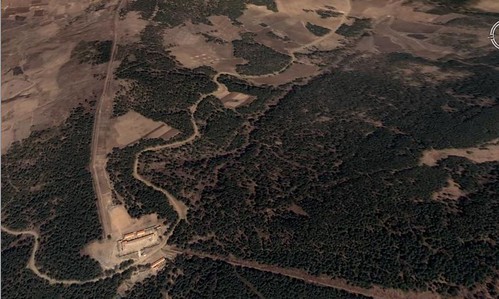The Gates of Hell: 42.471N, 129.824E

These are the gates though which prisoners enter Camp 22 in North Hamgyeong province. Camp 22 is the largest and worst of North Korea’s prison camps, with some portions set aside as a “life imprisonment zone” for prisoners who will never leave. Escaped prisoners and guards report that prisoners are killed in a gas chamber in the camp’s administration area, approximately 8 miles down the road in the background (no high-resolution photograph of the administration area is available on Google Earth, but is available here). According to a recent report attributed to British intelligence, infants, the handicapped, and other prisoners are subjected to lethal biological warfare experiments there.
The camp’s fence is clearly visible on the left and bottom of this image. The faint light patches in intervals along the fence line are guard towers.
I’m sure if they had any rice paddies to cultivate, the aerial photos would read “euthanize,” or “bomb us” in English.
While I know this isn’t a serious comment, the rice paddies do tell tales. First, it’s striking how much bare ground there is in North Korea that seems to be completely unused — just wasteland. Second, the existing rice paddies all have distinctive heaps of straw in the center. If my wife and I are guessing correctly, these indicate that grain is harvested by hand or with draft animals, and that the straw is heaped in the center of the field. If the grain were harvested mechanically, as in the South, you wouldn’t see that. I have yet to find one North Korean field (except during the growing season) not to have one of those heaps, meaning that there’s almost no mechanization of agriculture. Also, there are large areas where there appears to be no rice grown at all — just corn, and maybe some wheat or other grains.
The villages are astonishingly isolated. Many have thatched roofs, although tiles are more common. Overall, the impression in many areas (esp. the NE) is medievel. In the area around Pyongyang, however, you can see things you might have seen in South Korea in the 80’s — apartment blocks and even some large farms where hogs and cattle are raised.